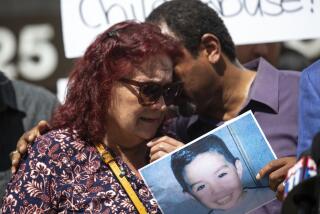When you write about Dependency Court, you get an earful
Anytime I write about Dependency Court, where foster care matters are heard and decided, I get a load of email, and of widely varying types. There are those, still, who object to a reporter attending hearings of the court, which was generally closed until last year, when Presiding Judge Michael Nash, who oversees Juvenile Court in Los Angeles, reversed that presumption and opened those courtrooms. There are those who complain that The Times generally, and me specifically, are too hard on social workers or others in the system who are trying to do complicated, difficult work and who resent being second-guessed by the press. And there are those, tragically, who feel mistreated by those social workers and others and who welcome scrutiny and accountability.
My column Monday, “Failing our children, in and out of court,” produced all of those reactions, along with the even more predictable one: that somehow this is all about illegal immigration. Oh brother.
One reader angrily challenged Nash’s contention that social workers need more and better training. Another complained that foster care was a byproduct of a “culture of dependency” and suggested that public policy encouraged families to have children even though they can’t support them. Still another suggested exploring mandatory sterilization or birth control. These are angry people.
OP-ED: Breaking the vicious cycle of foster care
In emails to me directly, the problems were more poignant and the proposed solutions less glib. One man relayed the details of a case in which two little girls were taken from their mother and grandparents, a case he described as “a huge miscarriage of justice.” A foster parent wrote to bemoan the repeated delays that drag out court hearings and custody matters, an issue I’ve written about before.
That writer added, incidentally, that Nash’s order opening the proceedings is often ignored by judges who close hearings without making any determination that a child’s welfare would be harmed by the presence of outsiders, including reporters. That hasn’t been my experience over the last year, but if that’s happening out of the view of the press, that’s a problem.
That last point underscores something I’ve found over the last year, as I’ve regularly attended proceedings at the Dependency Court. At the outset of this regime of openness, many participants in the system warned that having reporters in court would intimidate and traumatize children. My experience has been the opposite. When families realize that I’m in court, they seek me out, often with heartbreaking stories of what they consider mistreatment by judges, social workers and lawyers. Not only do they not object to a reporter being present, they complain that reporters aren’t present more often to see what happens in these courtrooms.
Even after a year, openness is unsettling to some. But in that year, the public has gotten a glimpse of how these courts run, and the judges have generally done a thoughtful job weighing the public’s right to know against any potential harm to a child. And as far as I know, no child has suffered.
ALSO:
Why such hysteria over fracking?
Preserving affirmative action for the wrong reason
Roberts to Congress: We warned you about voting rights
More to Read
A cure for the common opinion
Get thought-provoking perspectives with our weekly newsletter.
You may occasionally receive promotional content from the Los Angeles Times.







